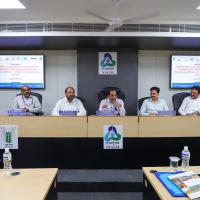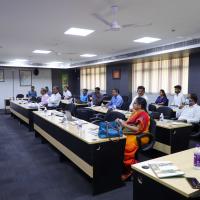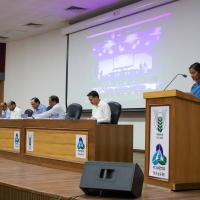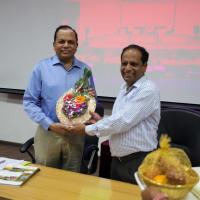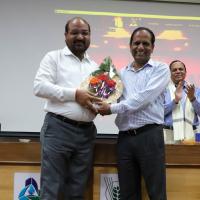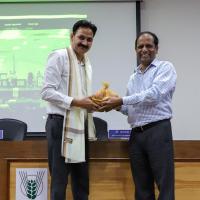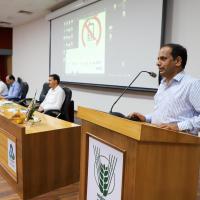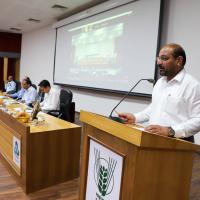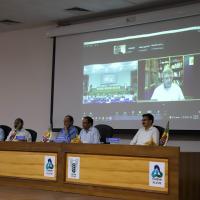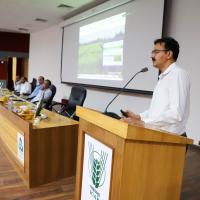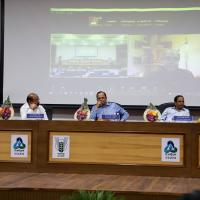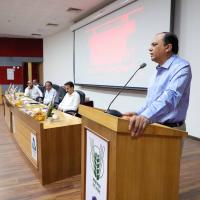Workshop on AGROTAIN Incorporated Urea Produced with N-TEGRATION Technology to address fertilizer use efficiency in major cropping systems of India during 27-28 April, 2022 at ICAR-NIASM
ICAR-National Institute of Abiotic Stress Management (NIASM) in collaboration with CIMMYT, India and ICAR-Central Soil Salinity Research Institute (CSSRI), Karnal organized an international workshop on AGROTAIN Incorporated Urea Produced with N-TEGRATIONTM Technology to address fertilizer use efficiency in major cropping systems of India during 27-28 April, 2022 at ICAR, NIASM, Baramti, India.
The workshop was inaugurated on 27th April, 2022 by Dr M.L. Jat, Principal scientist and system agronomist, CIMMYT, Nepal and chaired by Dr Himanshu Pathak, Director, ICAR-NIASM along with Dr. H S Jat, Principal scientist (agronomy) and overall principal investigator of the project, ICAR-CSSRI, Karnal and Dr D. S. Rana, senior agronomist, CIMMYT, India. During the session performance of agrotain incorporated urea at seven project locations of India (ICAR-CSSRI, Karnal (maize-wheat), BISA, Ludhiana (rice-wheat), IISS, Bhopal (maize-wheat), IIWM, Bhubaneshwar (Rice-rice), PJTSAU, Hyderabad (rice-rice), BISA, Samastipur (rice-maize) and ICAR-NIASM (sugarcane) were presented by respective center coordinators for 2020-21 and 2021-22 followed by a detailed discussion on agrotain behavior under different climatic conditions and future work plan of the project.
A plenary session was organized on 28th April, 2022 where Dr. S.K. Chaudhari, DDG (NRM), ICAR was the chief guest along with other dignitaries like Dr Himanshu pathak, Dr ML Jat and Dr HS Jat. Professor JK Ladha, Adjunct professor, University of California, Davis, Dr Greg Schwab and Dr Ashish Aggrawal from Koch Agronomic Services, graced the occasion through online mode. The session started with a field visit to the experimental plots of ICAR, NIASM followed by welcome address and presentation on “enhancing efficiency of fertilizer urea” highlighting discovery of urea, its fate from factory to food, losses to environment and its impact on global ammonia emission and different ways for reducing the losses to improve its use efficiency by the chairperson, Dr. Himanshu Pathak. Dr ML Jat, CIMMYT, briefed about the importance and objectives of the project workshop; Dr Greg Schwab emphasized on how saving of nitrogen fertilizer import through use of urease inhibitors like agrotain will have an immense impact on Indian economy. Dr H S Jat, Principal investigator of the project provided an overall overview of the salient findings of research of all the seven locations. The Plenary lecture on “Strategies to exploit N crisis to opportunity-Improve NUE ?” was given by Prof. JK Ladha highlighting several components of system monitoring for a sustainable and judicious use of N in crop production. He also suggested that urea import by India can be reduced to about 1.4 mt from current 4.86 mt through use of agrotain and other related strategies, assuming they save 20% of total fertilizer requirement. Dr SK Chaudhari, chief guest of the plenary session, in his special remarks, gave insights on current fertilizer crisis of India, complexities in taking any policy decisions considering social, economic and political aspects of India and options for enhancing fertilizer use efficiency. He also suggested in order to popularize agrotain incorporated urea, as an alternative for future N use, there is need for a holistic approach along with supporting information on its retention, nitrification and urease activity for another two seasons along with inclusion of representative locations of different agroecologies viz., coastal, arid and hilly ecosystems for drawing a logical conclusion. The session was concluded with the vote of thanks by Dr Jagadish Rane.
Around 150 participants including scientist, technical and administration staff, students and research scholars attended the plenary session in a hybrid mode. The workshop was organized and coordinated by Dr. Aliza Pradhan (Convenor) and Dr Jagadish Rane, Dr Pravin B Taware, Dr Sangram Chavan, Mr Lalit Aher, Mr Nitin Taware, Ms Dhanashri Shid and Mr Swapnil Uchchale (Co-convenors).

